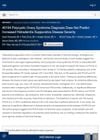 11 citations,
March 2021 in “Reproductive Biology and Endocrinology”
11 citations,
March 2021 in “Reproductive Biology and Endocrinology” Polycystic Ovary Syndrome (PCOS) symptoms vary globally, with bloating, high cholesterol, and glucose levels being common; the current diagnostic criteria may need refining.
 September 2023 in “Journal of the American Academy of Dermatology”
September 2023 in “Journal of the American Academy of Dermatology” Having PCOS does not make hidradenitis suppurativa worse.
 18 citations,
April 2016 in “Endocrinology and Metabolism Clinics of North America”
18 citations,
April 2016 in “Endocrinology and Metabolism Clinics of North America” The document concludes that diagnosing PCOS in teenagers is difficult and should focus on specific hormone levels and menstrual irregularities, while also considering treatment for symptoms and related health issues.
 12 citations,
March 2015 in “Pediatric Dermatology”
12 citations,
March 2015 in “Pediatric Dermatology” Early diagnosis and treatment of PCOS in young people is important to prevent long-term health problems.
 September 2022 in “Women's healthcare”
September 2022 in “Women's healthcare” PCOS is managed by lifestyle changes and personalized medication to improve symptoms and fertility.
 5 citations,
March 2015 in “Women's Health”
5 citations,
March 2015 in “Women's Health” The document concludes that diagnosing PCOS requires a thorough approach, considering various symptoms and risks, and calls for improved methods to identify PCOS types and prevent diabetes.
 378 citations,
November 2011 in “Human reproduction update”
378 citations,
November 2011 in “Human reproduction update” Experts recommend using evidence-based methods to diagnose and treat hirsutism, focusing on symptoms and underlying causes.
 212 citations,
May 2010 in “American Journal of Obstetrics and Gynecology”
212 citations,
May 2010 in “American Journal of Obstetrics and Gynecology” Diagnosing PCOS in teenagers is challenging and should use strict criteria to avoid misdiagnosis and unnecessary worry.
 59 citations,
August 2007 in “Clinical Endocrinology”
59 citations,
August 2007 in “Clinical Endocrinology” The current methods for diagnosing polycystic ovary syndrome are too vague and may lead to misdiagnosis and problems in research.
 4 citations,
November 2012 in “Obstetrics, Gynaecology & Reproductive Medicine”
4 citations,
November 2012 in “Obstetrics, Gynaecology & Reproductive Medicine” Lifestyle changes and clomiphene are first-line treatments for infertility in women with PCOS, with other options available if these fail.
 September 2023 in “Reproductive health of woman”
September 2023 in “Reproductive health of woman” PCOS is common, affects fertility, and requires personalized treatment to manage symptoms and health risks.
 21 citations,
December 2007 in “Primary Care”
21 citations,
December 2007 in “Primary Care” Early diagnosis and treatment of PCOS is crucial to reduce emotional distress and health risks.
 2 citations,
October 2008 in “The Journal for Nurse Practitioners”
2 citations,
October 2008 in “The Journal for Nurse Practitioners” The document concludes that managing PCOS requires a comprehensive approach, including lifestyle changes and medication, to improve symptoms and reduce health risks.
 December 2024 in “Archiv Euromedica”
December 2024 in “Archiv Euromedica” Early diagnosis and personalized treatment are crucial for managing PCOS and preventing complications.
 73 citations,
February 2007 in “The American Journal of Medicine”
73 citations,
February 2007 in “The American Journal of Medicine” PCOS is a common hormonal disorder in women, treated with lifestyle changes and medications like hormonal contraceptives and metformin.
 97 citations,
July 2006 in “Dermatologic therapy”
97 citations,
July 2006 in “Dermatologic therapy” The document concludes that accurate diagnosis and personalized treatment are important for skin problems in women with PCOS.
 14 citations,
July 2016 in “Fertility and Sterility”
14 citations,
July 2016 in “Fertility and Sterility” Changing the diagnosis criteria for PCOS might miss women at risk for related health issues.
 30 citations,
April 2014 in “Seminars in Reproductive Medicine”
30 citations,
April 2014 in “Seminars in Reproductive Medicine” Diagnosing PCOS in teenagers is hard because its symptoms often look like normal puberty, and there's a need for better diagnosis methods and agreement on criteria.
 13 citations,
October 2011 in “Clinical Obstetrics and Gynecology”
13 citations,
October 2011 in “Clinical Obstetrics and Gynecology” Women with PCOS-related infertility can often conceive with treatments like clomiphene and metformin, but managing pregnancy complications is important.
 9 citations,
January 2015 in “Springer eBooks”
9 citations,
January 2015 in “Springer eBooks” The document concludes that managing PCOS involves treating symptoms, regulating periods, and reducing health risks, with specific medications for fertility and metabolic issues.
 97 citations,
February 2007 in “Clinical Obstetrics and Gynecology”
97 citations,
February 2007 in “Clinical Obstetrics and Gynecology” The definition of Polycystic Ovary Syndrome may change with new research, and careful screening is key for managing the condition.
 1265 citations,
October 2013 in “The Journal of Clinical Endocrinology and Metabolism”
1265 citations,
October 2013 in “The Journal of Clinical Endocrinology and Metabolism” The guideline suggests using specific criteria to diagnose PCOS, recommends various treatments for its symptoms, and advises screening for related health issues.
 26 citations,
November 2011 in “Arquivos Brasileiros De Endocrinologia E Metabologia”
26 citations,
November 2011 in “Arquivos Brasileiros De Endocrinologia E Metabologia” Diagnosing PCOS in teenagers should focus on signs of excess male hormones and not rely solely on ovarian ultrasound or irregular periods, and should be reassessed in adulthood.
 20 citations,
September 2020 in “International journal of computer applications”
20 citations,
September 2020 in “International journal of computer applications” The Random Forest algorithm was the most accurate at diagnosing Polycystic Ovarian Syndrome.
 19 citations,
July 2013 in “The obstetrician & gynaecologist”
19 citations,
July 2013 in “The obstetrician & gynaecologist” The document concludes that careful evaluation is needed to diagnose PCOS correctly due to similar symptoms in other conditions, and accurate testosterone level measurement is crucial.
 4 citations,
January 2019 in “Clinical Chemistry”
4 citations,
January 2019 in “Clinical Chemistry” Diagnosing Polycystic Ovary Syndrome is hard due to varying symptoms, no set criteria, and the need for better tests and education.
 2 citations,
September 2014 in “Journal of evolution of medical and dental sciences”
2 citations,
September 2014 in “Journal of evolution of medical and dental sciences” Evaluating various physical and health factors helps diagnose polycystic ovarian syndrome (PCOS).
 6 citations,
July 2016 in “Gynecological Endocrinology”
6 citations,
July 2016 in “Gynecological Endocrinology” PSA levels are higher in women with PCOS, but FAI is a more accurate marker for diagnosis.
 May 2023 in “Journal of Student Research”
May 2023 in “Journal of Student Research” Creating specific biological indicators is important for early detection and treatment of PCOS.
 October 2016 in “Journal of the Dermatology Nurses’ Association”
October 2016 in “Journal of the Dermatology Nurses’ Association” Polycystic Ovary Syndrome (PCOS) affects 6%-15% of women of reproductive age, causing symptoms like acne and hair loss, and increasing the risk of type 2 diabetes and heart disease; it's managed through diet, exercise, and medications like Metformin and hormonal contraceptives.





























